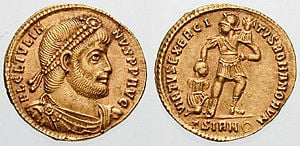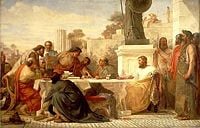Julian the Apostate
| Flavius Claudius Iulianus | ||
|---|---|---|
| Emperor of the Roman Empire | ||
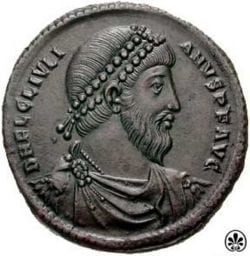
| ||
| Flavius Claudius Iulianus, also known as Julian the Apostate, was the last pagan Roman Emperor. | ||
| Reign | November 3, 361 - June 26, 363 | |
| Born | 331 | |
| Constantinople | ||
| Died | June 26, 363 | |
| Maranga, Mesopotamia | ||
| Predecessor | Constantius II, cousin | |
| Successor | Jovian, general present at the time of his death | |
| Wife/wives | Helena (355) | |
| Issue | None known | |
| Dynasty | Constantinian dynasty | |
| Father | Julius Constantius | |
| Mother | Basilina | |
Flavius Claudius Iulianus (331–June 26, 363), was a Roman Emperor (361–363) of the Constantinian dynasty. He was the last pagan Roman Emperor, and tried to promote the Roman religious traditions of earlier centuries as a means of slowing the spread of Christianity.
His philosophical studies earned him the attribute the Philosopher during the period of his life and of those of his successors. Christian sources commonly refer to him as Julian the Apostate, because of his rejection of Christianity, conversion to Theurgy (a late form of Neoplatonism), and attempt to rid the empire of Christianity while bringing back ancient Roman religion.[1] He is also sometimes referred to as Julian II, to distinguish him from Didius Julianus (133–193 C.E.).
His model was Marcus Aurelius. He set out to reform the administration, reducing many expenses. He had the makings of a competent, intelligent emperor. He was better educated and more cultured than any Emperor had been for more than a century. However, in choosing to resurrect the old religion against the new faith, he backed the wrong side. Christianity's momemtum was too strong to be halted. He did not lack virtue, suggested by his early edicts on religious tolerance and his personal lack of ostentation. His premature death on from a battle-field wound may have resulted from a belief in his own invincibility, perhaps in his destiny to restore Rome's days of pagan glory based on the Sibylline oracle that appeared to promise victory against the Persians.
Life
The early years
Julian, born in 331 in Constantinople, was the son of Julius Constantius, half brother of Emperor Constantine I, and his second wife, Basilina. His paternal grandparents were Western Roman Emperor Constantius Chlorus and his second wife, Flavia Maximiana Theodora. His maternal grandfather was Caeionius Iulianus Camenius.
In the turmoil after the death of Constantine in 337, in order to establish himself as sole emperor, Julian's zealous Arian Christian cousin Constantius II led a massacre of Julian's family. Constantius ordered the murders of many descendants from the second marriage of Constantius Chlorus and Theodora, leaving only Constantius and his brothers Constantine II and Constans, and their cousins Julian and Gallus, Julian's half brother, as surviving males related to Emperor Constantine. Constantius II, Constans, and Constantine II were proclaimed joint emperors, each ruling a portion of Roman territory. Constantius II then saw to a strict Arian Christian education of the surviving Julian and his brother Gallus.
In traditional accounts of his life, considerable weight is given to Julian’s early psychological development and education. Initially growing up in Bithynia, raised by his maternal grandmother, at the age of seven he was tutored by Eusebius, the Arian Christian Bishop of Nicomedia, and Mardonius, a Gothic eunuch. However, in 342, both Julian and his half-brother Gallus were exiled to the imperial estate of Macellum in Cappadocia. Here he met the Christian bishop George. At the age of 18, the exile was lifted and he dwelt briefly in Constantinople and Nicomedia.
In 351, Julian returned to Asia Minor to study Neoplatonism under Aedesius, and later to study the Iamblichan Neoplatonism from Maximus of Ephesus. During his studies in Athens, Julian met Gregory Nazianzus and Basil of Caesarea, two Christian saints.
The later emperor’s study of Iamblichus of Chalcis and theurgy are a source of criticism from his primary chronicler, Ammianus Marcellinus.
Rise to power
Constantine II died in 340 when he attacked his brother Constans. Constans in turn fell in 350 in the war against the usurper Magnentius. This left Constantius II as the sole remaining emperor. In need of support, he made Julian's brother, Constantius Gallus, Caesar of the East in 351, while Constantius II himself turned his attention westward to Magnentius, whom he defeated decisively in 351. Shortly afterwards Gallus, who had imposed a rule of terror during his brief reign, was executed (354), and Julian himself briefly imprisoned. However Constantius still had to deal with the Sassanid threat in the East, and so he turned to his last remaining male relative, Julian. He was summoned to the emperor in Mediolanum (Milan) and, on November 6, 355, made "Caesar of the West" and married to Constantius' sister Helena.
In the years afterwards Julian fought the Germanic tribes that tried to intrude upon the Roman Empire. He won back Colonia Agrippina (Cologne) in 356, during his first campaign in Gaul. The following summer he along with an army of 13,000 men[2] defeated the Alamanni at the Battle of Strasbourg, a major Roman victory. In 358, Julian gained victories over the Salian Franks on the Lower Rhine, settling them in Toxandria, near the city of Xanten, and over the Chamavi. During his residence in Gaul, Julian also attended to non-military matters. He prevented a tax increase by the Gallic praetorian prefect Florentius and personally administered the province of Belgica Secunda.
In the fourth year of his campaign in Gaul, the Sassanid Emperor Shapur II invaded Mesopotamia and took the city of Amida after a 73-day siege. In February 360, Constantius ordered Julian to send Gallic troops to his eastern army. This provoked an insurrection by troops of the Petulantes, who proclaimed Julian emperor in Paris, and led to a very swift military campaign to secure or win the allegiance of others. From June to August of that year, Julian led a successful campaign against the Attuarian Franks.
That same June, forces loyal to Constantius II captured the city of Aquileia on the north Adriatic coast, and was subsequently besieged by 23,000 men[3] loyal to Julian. Civil war was avoided only by the death of Constantius II, who, in his last will, recognized Julian as his rightful successor.
Among his first actions, Julian reduced the expenses of the imperial court, removing all the eunuchs from the offices. He reduced the luxury of the court established with Constantius, reducing at the same time the number of servants and of the guard. He also started the Chalcedon tribunal where some followers of Constantius were tortured and killed under supervision of magister militum Arbitio.
Julian's religious beliefs and antipathy toward Christianity
Julian is called by Christians "the Apostate" because he converted from Christianity to Theurgy. As attested in private letters between him and the rhetorician Libanius, Julian had Christianity forced on him as a child by his cousin Constantius II, who was a zealous Arian Christian and would have not tolerated a pagan relative. "Reacting violently against the Christian teaching that he had received in a lonely and miserable childhood," A.H.M. Jones observes, "he had developed a passionate interest in the art, literature and mythology of Greece and had grown to detest the new religion which condemned all he loved as pernicious vanity. He was of a strongly religious temperament, and found solace in the pantheistic mysticism which contemporary Neoplatonist philosophers taught."[4] After his conversion to Hellenism he devoted his life to protecting and restoring the fame and security of this tradition.
After gaining the purple, Julian started a religious reformation of the state, which was intended to restore the lost strength of the Roman State. He also forced the Christian church to return the riches, or fines equalling them, looted from the pagan temples after the Christian religion was made legitimate by Constantine. He supported the restoration of the old Roman faith, based on polytheism. His laws tended to target wealthy and educated Christians, and his aim was not to destroy Christianity but to drive the religion out of "the governing classes of the empire—much as Buddhism was driven back into the lower classes by a revived Confucian mandarinate in thirteenth-century China."[5]
Julian reduced the influence of Christian bishops in public offices. The lands taken by the Church were to be returned to their original owners, and the bishops lost the privilege to travel for free, at expenses of the State.
Edict on Religious Liberty
On February 4, 362, Julian promulgated an edict to guarantee freedom of religion. This edict proclaimed that all the religions were equal in front of the Law, and that the Roman Empire had to return to its original religious eclecticism, according to which the Roman State did not impose any religion on its provinces.
During his earlier years, while studying at Athens, Julian became acquainted with two men who later became both bishops and saints: Gregory Nazianzus and Basil the Great; in the same period, Julian was also initiated to the Eleusinian Mysteries, which he would later try to restore. Constantine and his immediate successors had forbidden the upkeep of pagan temples, and many temples were destroyed and pagan worshippers of the old religions killed during the reign of Constantine and his successors. The extent to which the emperors approved or commanded these destructions and killings is disputed, but it is certain they did not prevent them.
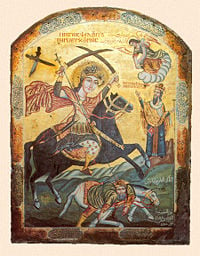
(224 – 250) to help him, and the saint appeared in a vision to Basil, claiming to have speared Julian to death.
Julian's religious status is a matter of considerable dispute. According to one theory (that of G.W. Bowersock in particular), Julian's Paganism was highly eccentric and atypical because it was heavily influenced by an esoteric approach to Platonic philosophy sometimes identified as theurgy and also neoplatonism. Others (Rowland Smith, in particular) have argued that Julian's philosophical perspective was nothing unusual for a "cultured" Pagan of his time, and, at any rate, that Julian's Paganism was not limited to philosophy alone, and that he was deeply devoted to the same Gods and Goddesses as other Pagans of his day. According to Christian historian Socrates Scholasticus (iii, 21), Julian believed himself to be Alexander the Great in another body via transmigration of souls, as taught by Plato and Pythagoras.
Anti-Christian Edicts
Since the persecution of Christians by past Roman Emperors had seemingly only strengthened Christianity, many of Julian's actions were designed to harass and undermine the ability of Christians to organize in resistance to the re-establishment of pagan acceptance in the empire.[6] Julian's preference for a non-Christian and non-philosophical view of Iamblichus' theurgy seems to have convinced him that it was right to outlaw the practise of the Christian view of theurgy and demand that suppression of the Christian set of Mysteries. The Orthodox and Roman Catholic Churches retell a story concerning two of his bodyguards who were Christian. When Julian came to Antioch, he prohibited the veneration of the relics. The two bodyguards opposed the edict, and were executed at Julian's command. The Orthodox Church remembers them as saints Juventinus and Saint Maximos the Confessor.
In his School Edict Julian forbids Christian teachers from using the pagan scripts (such as the Iliad) that formed the core of Roman education: "If they want to learn literature, they have Luke and Mark: Let them go back to their churches and expound on them," the edict says.[5] This was an attempt to remove some of the power of Christian schools which at that time and later have used at large ancient Greek literature in their teachings in their effort to present Christian religion superior to the previous. The edict was also a severe financial blow, as it deprived Christian scholars, tutors and teachers of many students.
In his Tolerance Edict of 362, Julian decreed the reopening of pagan temples, the restitution of alienated temple properties, and called back Christian bishops that were exiled by church edicts. The latter was an instance of tolerance of different religious views, but may also have been seen as an attempt by Julian to widen a schism between different Christian sects, further weakening the Christian movement as a whole.[7]
Because Christian charities were beneficial to all, including pagans, it put this aspect of the Roman citizens' life out of the control of the imperial authority and under that of the church.[8] Thus Julian envisioned the institution of a Roman philanthropic system, and cared for the behavior and the morality of the pagan priests, in the hope that it would mitigate the reliance of pagans on Christian charity:
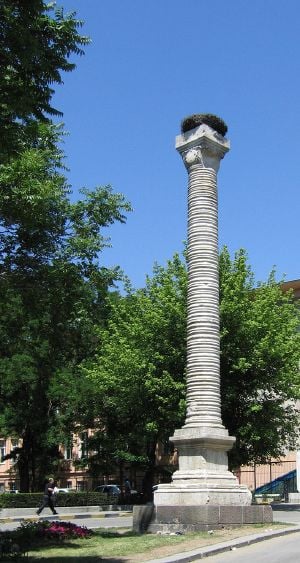
- These impious Galileans not only feed their own poor, but ours also; welcoming them into their agapae, they attract them, as children are attracted, with cakes.[9]
- Whilst the pagan priests neglect the poor, the hated Galileans devote themselves to works of charity, and by a display of false compassion have established and given effect to their pernicious errors. See their love-feasts, and their tables spread for the indigent. Such practice is common among them, and causes a contempt for our gods.[10]
His care in the institution of a pagan hierarchy in opposition to the Christian one was due to his wish to create a society in which every aspect of the life of the citizens was to be connected, through layers of intermediate levels, to the consolidated figure of the Emperor - the final provider for all the needs of his people. Within this project, there was no place for a parallel institution, such as the Christian hierarchy or the Christian charity.[11]
After his arrival in Antiochia in preparation for the Persian war, the temple of Apollo burned down. Since Julian believed Christians to be responsible, their main church was closed. He denounced Christianity as of appeal only to rustics. It was nothing more than fables and irrational dogmas. It was nothing but trickery.
Julian's attempt to rebuild the Jewish Temple
In 363, Julian, on his way to engage Persia, stopped at the ruins of the Second Temple in Jerusalem. In keeping with his effort to foster religions other than Christianity, Julian ordered the Temple rebuilt. The failure to rebuild the Temple has been ascribed to an earthquake, common in the region, and to the Jews' ambivalence about the project. Sabotage is a possibility, as is an accidental fire. Divine intervention was the common view among Christian historians of the time.[12]
Death
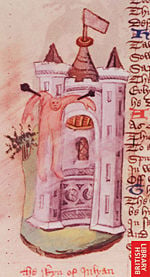
In March 363, Julian started his campaign against the Sassanid Empire, with the goal of taking back the Roman cities conquered by the Sassanids under the rule of Constantius II which his cousin had failed to take back.
Receiving encouragement from an oracle in the old Sibylline Books posted from Rome, and moving forward from Antioch with about 90,000 men, Julian entered Sassanid territory. An army of 30,000 was sent, under the command of Procopius, to Armenia from where, having received reinforcements from the King of Armenia, it was to attack the Sassanid capital from the north. Julian victoriously led the Roman army into enemy territory, conquering several cities and defeating the Sassanid troops. He arrived under the walls of the Sassanid capital, Ctesiphon, but even after defeating a superior Sassanid army in front of the city (Battle of Ctesiphon), he could not take the Persian capital. Also Procopius did not return with his troops, so Julian decided to lead his army back to the safety of the Roman borders.
During this retreat, on June 26, 363, Julian died near Maranga, aged 31, during a battle against the Sassanid army. While pursuing the retreating enemy with few men, and not wearing armor, he received a wound from a spear that reportedly pierced the lower lobe of his liver, the peritoneum and intestines. The wound was not immediately deadly. Julian was treated by his personal physician, Oribasius of Pergamum, who seems to have made every attempt to treat the wound. This probably included the irrigation of the wound with a dark wine, and a procedure known as gastrorrhaphy, in which an attempt is made to suture the damaged intestine.
Libanius states that Julian was assassinated by a Christian who was one of his own soldiers; this charge is not corroborated by Ammianus Marcellinus or other contemporary historians. Julian was succeeded by the short-lived Emperor Jovian (331 - February 17, 364).
Libanius says in his epitaph of the deceased emperor (18.304) that "I have mentioned representations (of Julian); many cities have set him beside the images of the gods and honour him as they do the gods. Already a blessing has been besought of him in prayer, and it was not in vain. To such an extent has he literally ascended to the gods and received a share of their power from him themselves." However, no similar action was taken by the Roman central government, which would be more and more dominated by Christians in the ensuing decades.
The report that his dying words were Vicisti, Galilaee ("You have won, Galilean") is onsidered apocryphal, supposedly expressing his recognition that, with his death, Christianity would become the Empire's state religion. The phrase introduces the 1866 poem Hymn to Proserpine, which was Algernon Swinburne's elaboration of what Julian might have felt at the triumph of Christianity.
Legacy
Julian's anti-Christian measures did not survive, nor did they have much effect on slowing down the rapid spread of the Christian religion. Julian's own high priest urged pagans to imitate Christian charity. More than the trapings of power, which is was beginning to accumulate, it was Christian charity that won the support and gratitude of the people.
Julian as a writer
Julian wrote several works in Greek, some of which have come down to us.
- Hymn to King Helios
- Hymn to the Mother of the Gods
- Two panegyrics to Constantius
- Misopogon or "Beard Hater" - a light-hearted account of his clash with the inhabitants of Antioch after he was mocked for his beard and generally scruffy appearance for an emperor
- The Caesars - a humorous tale of a contest between some of the most notable Roman emperors. This was a satiric attack upon the recent Constantine, whose worth, both as a Christian and as the leader of the Roman Empire, Julian severely questions
- "Against the Galileans," Grand Rapids, MI: CCEL, Calvin CollegeAgainst the Galilaeans - a critique of Christianity, only partially preserved, thanks to Cyril of Alexandria's rebuttal Against Julian Retrieved October 5, 2007.
The works of Julian were edited and translated by Wilmer Cave Wright as The Works of the Emperor Julian (3 vols.). London: W. Heinemann, 1923.
Notes
- ↑ Modern Neo-Pagans (particularly reconstructionists) sometimes refer to him as "Julian the Faithful," in direct opposition to the pejorative implications of the common epithet "the Apostate".
- ↑ John Julius Norwich. Byzantium. (New York: Knopf, 1989 ISBN 9780394537788), 86
- ↑ Norwich, 89
- ↑ A.H.M. Jones. The Later Roman Empire, 284-602: A Social Economic and Administrative Survey. (Baltimore: Johns Hopkins University Press, 1986. ISBN 9780801832840), 120.
- ↑ 5.0 5.1 Peter Robert Lamont Brown. The World of Late Antiquity: AD 150-750. (Library of world civilization) (New York: W.W. Norton, 1989. ISBN 9780155976337), 93.
- ↑ Julian, Epistulae, 52.436A ff.
- ↑ Ammianus Marcellinus, Res Gestae Libri XXXI, 22.5.4.
- ↑ Many historians agree that prior to the advent of Christianity, there was a distinct lack of love-motivated charity in the ancient world, and indeed in the Roman Empire. That is not to say that there was no philanthropy in the history of the Empire - patricians long before Julian's time had been expected to finance the baths and public buildings, for example. However, this was "dictated much more by policy than by benevolence" (WEH Lecky); because love was rare in the pagan philanthropic environment, it was "alien to human nature," and part of the reason Julian's project failed was because of the inspiration of Christian agape in charity: Julian himself ultimately "conceded that the Christians outshone the pagans in their devotion to charitable work." (Thomas Woods). Sources:
- Uhlhorn, Gerhard. Christian Charity in the Ancient Church. (New York: Charles Scribner's Sons, 1883), 2-44
- Woods, Thomas. How the Catholic Church Built Western Civilization. (Washington, DC: Regenery, 2005. ISBN 0895260387)
- Lecky, W. E. H. History of European Morals From Augustus to Charlemagne. (New York: Arno Press, 1975. ISBN 9780405065187)
- ↑ Charles Schmidt. The Social Results of Early Christianity. (London: Wm. Isbister, 1889), 328
- ↑ Gaetano Baluffi and Denis Gargan. The Charity of the Church, a Proof of Her Divinity. (Dublin: M.H. Gill and Son, 1885), 16
- ↑ Walter E. Roberts and Michael DiMaio, "Juilian the Apostate," in De Imperatoribus Romanis- An Online Encyclopedia of Roman Emperors. (2002) Roberts, Walter E., and Michael DiMaio, "Julian the Apostate (360-363 C.E.) romanemperors.org. Retrieved October 5, 2007.
- ↑ See "Julian and the Jews," in Medieval Sourcebook, "Julian and the Jews 361-363 C.E.", introduction by Jacob Marcus. Fordham University. Retrieved October 5, 2007
ReferencesISBN links support NWE through referral fees
Primary sources
Works by Julian
- Oration upon the Sovereign Sun (Tertullian.org) Retrieved October 5, 2007.
- Oration upon the Mother of the Gods (Tertullian.org) Retrieved October 5, 2007.
- Against the Galileans (Turtullian.org) Retrieved October 5, 2007.
Works about Julian
- Ammianus Marcellinus, Res Gestae Libri XXXI
- Claudius Mamertinus, "Gratiarum actio Mamertini de consulato suo Iuliano Imperatori," Panegyrici Latini, panegyric delivered in Constantinople in 362, also as a speech of thanks at his assumption of the office of consul of that year
- Gregory Nazianzen, Orations, First Invective Against Julian, (Tertullian.org) Retrieved October 5, 2007.
- Second Invective Against Julian Retrieved October 5, 2007.
- Libanius, Monody—Funeral Oration for Julian the Apostate (Tertullian.org) (in English) Retrieved October 5, 2007.
Secondary sources
- Athanassiadi, Polymnia. Julian. An Intellectual Biography. London: Routledge, 1992. ISBN 041507763X.
- Baluffi, Gaetano, and Denis Gargan. The Charity of the Church, a Proof of Her Divinity. Dublin: M.H. Gill and Son, 1885.
- Brown, Peter Robert Lamont. The World of Late Antiquity: AD 150-750. (Library of world civilization) New York: W.W. Norton, 1989. ISBN 9780155976337.
- Bowersock, Glen Warren. Julian the Apostate. Cambridge, MA: Harvard University Press, 1978. ISBN 9780674488816.
- Jones, A.H.M. The Later Roman Empire, 284-602: A Social Economic and Administrative Survey. Baltimore: Johns Hopkins University Press, 1986. ISBN 9780801832840.
- Lascaratos, John, and Dionysios Voros, 2000, "Fatal Wounding of the Byzantine Emperor Julian the Apostate (361-363 C.E.): Approach to the Contribution of Ancient Surgery." World J. Surg 24: 615-619.
- Lecky, W. E. H. History of European Morals From Augustus to Charlemagne. New York: Arno Press, 1975. ISBN 9780405065187.
- Lenski, Noel Emmanuel. Failure of Empire: Valens and the Roman State in the Fourth Century AD. Berekeley: University of California Press, 2003. ISBN 9780520233324.
- Lieu, Samuel N., and Montserrat, Dominic. From Constantine to Julian: A Source History. NY: Routledge, 1996. ISBN 9780415093354.
- Murdoch, Adrian. The Last Pagan: Julian the Apostate and the Death of the Ancient World. Stroud, UK: Sutton, 2005. ISBN 0750940484
- Norwich, John Julius. Byzantium. New York: Knopf, 1989. ISBN 9780394537788.
- Roberts, Walter E., and Michael DiMaio, "Juilian the Apostate," in De Imperatoribus Romanis- An Online Encyclopedia of Roman Emperors (2002) Roberts, Walter E., and Michael DiMaio, "Julian the Apostate (360-363 C.E.) romanemperors.org. Retrieved October 5, 2007.
- Rohrbacher, David. Historians of Late Antiquity. NY: Routledge, 2002. ISBN 9780585447940.
- Schmidt, Charles. The Social Results of Early Christianity. London: Wm. Isbister, 1889.
- Smith, Rowland. Julian's gods: religion and philosophy in the thought and action of Julian the Apostate. London and NY: Routledge, 1995. ISBN 9780415034876.
- Uhlhorn, Gerhard. Christian Charity in the Ancient Church. New York: Charles Scribner's Sons, 1883.
- Woods, Thomas. How the Catholic Church Built Western Civilization. Washington, DC: Regenery, 2005. ISBN 0895260387.
External links
All links retrieved October 4, 2022.
- Laws of Julian
- The Julian Society
- A 4th century chalcedony portrait of Julian
- Statue of Julian the Apostate. Marble. 361—363. Paris, Louvre Museum
- Julian the Apostate, son of Constantius. Marble. Rome, Capitoline Museums
- Two Orations of the Emperor Julian, at sacred-texts, translated by Thomas Taylor
- Review of Rowland Smith's "Julian's Gods"
Credits
New World Encyclopedia writers and editors rewrote and completed the Wikipedia article in accordance with New World Encyclopedia standards. This article abides by terms of the Creative Commons CC-by-sa 3.0 License (CC-by-sa), which may be used and disseminated with proper attribution. Credit is due under the terms of this license that can reference both the New World Encyclopedia contributors and the selfless volunteer contributors of the Wikimedia Foundation. To cite this article click here for a list of acceptable citing formats.The history of earlier contributions by wikipedians is accessible to researchers here:
The history of this article since it was imported to New World Encyclopedia:
Note: Some restrictions may apply to use of individual images which are separately licensed.
